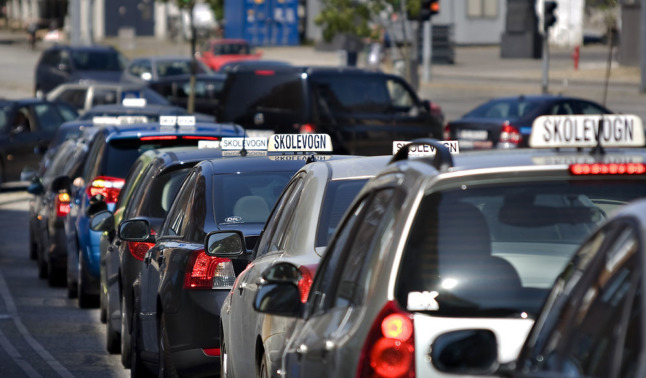This article is available to Members of The Local. Read more Membership Exclusives here.
But, for me at least, the things you miss once you’ve left (as I did in 2015) aren't necessarily the things you'd have imagined.
Here are the seven unusual things I miss the most since I left Sweden for my new home in France.
The accessible nature
They say Stockholm has 40 percent green space, and that there's a park within four hundred metres of you at all times. But you don't really notice it until you live somewhere with no parks. Yes, Sweden gets top marks for its green space, and the raw nature outside the city is world class too.

Djurgården in central Stockholm. Photo: Christine Olsson/TT
The order
I’ve heard people talk about the horrendous Catch-22s of Swedish admin – especially for foreigners. The rigmarole of getting a personnummer, the struggles of opening a bank without a job, and the troubles of getting anyone to read your CV. But Sweden is a walk in the park, at least compared to a country like France, where the red tape is legendary. Expats throw parties in France when they are finally granted social security, or citizenship. Consider yourselves lucky.

An orderly Swedish queue for a bank. Photo: Gustav Sjöholm/TT
The preparedness for winter
Sweden, as we all know, gets cold. I once saw -27C in Uppsala and I lived to tell the tale. But Sweden is so well prepared for the cold that you hardly notice it. The buses and trains are warm, as are the shops and restaurants, and the homes are crispy. But elsewhere in Europe, I’ve noticed that the winter seems to take everyone by surprise. I was eating in a Paris patisserie recently that had huge open doors and no heating. It was bone-chilling. If the same patisserie was in Sweden, all the customers would be dead.

Sweden copes relatively well with the winter. Photo: Hasse Holmberg/TT
Being the underdog
If Sweden was a dog, it would be a small one, capable of a big bark when it was necessary. And it would also be the underdog in almost every competitive event ever. And there’s something that I, as an expat there, really got into supporting. I used to feel a thrill to see a Swedish singer making it big, or a Swedish actor finding success in Hollywood. “They’re Swedish,” I’d say to friends or family. But in other countries, like in France or the UK or the US, success is kind of expected – and there's not the same kind of underdog pride.

What eliminating Italy from World Cup qualifying looks like. Photo: Fredrik Sandberg/TT
The generous paternal leave (even though I’ve never had kids)
This might sound like a weird one for a father-of-none, but I’ve seen the advantages of Sweden’s paternity leave and I like them. For one thing, as a fellow employee of someone who heads off for months to look after their kid, there’s suddenly new professional opportunities to fill while they’re away. The mother or father tends to come back refreshed, and you’re left with more experience, or even a better job. In France, the men get a handful of days off and return grumpy and tired, while you’ve been left to cover their back. And mothers only get 16 weeks.

Sweden is a good country to be a parent in. Photo: Hasse Holmberg/TT
The fact that everyone speaks English
Very, very few places on earth can claim that their nationals speak better English (as a second language) than the Swedes. So luckily for you as a foreigner in Sweden, if you’re learning Swedish, you’ll almost always be able to toss in English words when you’re lost and the conversation won’t lose momentum. And if you want to, you’ll certainly be able to open a bank account in English. But in other countries, like France, they are too petrified or too arrogant to lower themselves to speaking English. They don’t even try. I saw Blade Runner at the cinema recently and the ticket seller pronounced it “Blard roonaire”. He didn’t even try. Can you imagine a Swede saying it in a Swedish accent, “Blard-eh rune-ah-re”? Never.

It's easy to take the high standard of English in Sweden for granted. Photo: Leif R Jansson/TT
The passive aggression
Yep, I miss the arga lappar (passive aggressive angry notes) that Swedes leave in the laundry room. I prefer it tenfold over hot-tempered Europeans who beep their horn too much, who itch at the chance to argue, and who wave their hands in the air the second they’re uncomfortable. Confrontation gets everyone worked up – but at least in Sweden they hide behind their pen and paper. And what’s more, a great angry note is so silly that it can go viral, can be shared across the nation, and bring us all a smile. No amount of aggressive confrontation anywhere else in the world is going to make anyone else happy. Keep doing your thing, Sweden.

An exhibition of laundy room notes. Photo: Fredrik Sandberg/TT
What did you miss when you left Sweden? Or what do you think you would miss? Share your thoughts in the comments below.



 Please whitelist us to continue reading.
Please whitelist us to continue reading.
I,ll miss:
The extreme jelously of those whose head sticks up over others.
The lack of ability to accept a new person in sincere friendship, that they did not go to school with, a member of their family or a childhood friend.
The refusal to accept a non Swede speaking English, when most Swedes do and playing dumb in conversation. This is a tool used to exclude debate, conversation. due to limited worldly knowledge, beyond their town, village and individualistic natures.